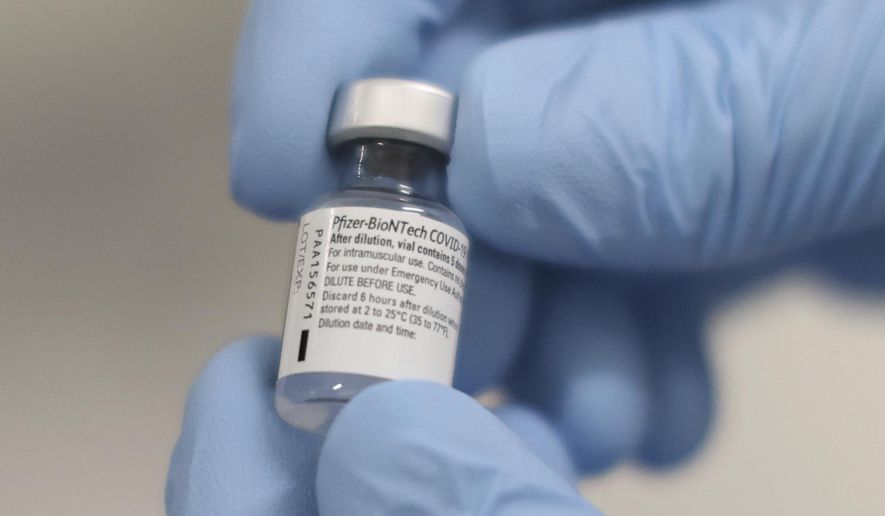An influential panel on Thursday recommended approving Pfizer’s coronavirus vaccine, clearing a path for the Food and Drug Administration to grant emergency approval so that states can inoculate health care workers and nursing home residents.
The FDA doesn’t have to listen to the advisory committee but it is expected to grant an emergency use authorization to Pfizer at any moment. Once granted, the “EUA” would result in millions of vaccine doses being loaded onto FedEx and UPS planes within 24 hours for delivery to sites across America.
“We believe the FDA is doing its work very much in the public eye,” Vice President Mike Pence said in South Carolina. “We anticipate in a matter of days the approval of the first coronavirus vaccine.”
The FDA’s Vaccines and Related Biological Products Advisory Committee, which consists of disease experts and doctors, spoke on a YouTube stream accessible to anyone interested in the arcane discussion about vaccine distribution, special populations and ways to let people in the placebo arm of trials get the actual vaccine.
The panel sparred over the inclusion of older teens but decided on a 17-4 vote, with one abstention, to authorize the vaccine for use in those 16 and older.
Pfizer requested emergency approval Nov. 20 after data showed its vaccine was 95% effective against COVID-19. Canada recently approved the vaccine, and the U.K. started injecting it into people this week.
Authorities are investigating adverse reactions in two members of the British National Health Service who had a history of allergies and had reactions after taking the vaccine.
The FDA said it is working on a warning that advises against using the vaccine in people who might be allergic to its components, though some advisers wondered whether that is enough and whether regulators should produce a clearer message.
“Perception is everything,” committee Chairman Arnold Monto said.
The FDA panel debated the vaccine as the virus rages across the country.
More than 3,000 U.S. deaths from COVID-19 were recorded for the first time on Wednesday, and more than 106,000 patients were hospitalized for the disease, taxing doctors and nurses across the country. The U.S. death toll stands at nearly 291,000.
Dick Hinch, who died one week after being sworn in as New Hampshire House speaker, was killed by COVID-19, an autopsy found Thursday.
Ellen DeGeneres paused taping of her popular talk show after testing positive for COVID-19, though she said she is “feeling fine” and her close contacts have been notified.
Officials on President Trump’s Operation Warp Speed believe they can get shots into 20 million people before the end of the year. Besides Pfizer’s version, the FDA advisory panel is set to evaluate Moderna’s application next week. Both drugmakers’ versions use a pioneering messenger-RNA platform.
Pfizer on Thursday described how mRNA directs the cell’s machinery to make proteins that produce an antibody response and fight off the virus.
“In a nutshell, the immune responses induced by the mRNA vaccine are similar to what you may get in response to a viral infection, but, of course, the mRNA vaccine is not infectious and cannot cause disease,” said Kathrin Jansen, a senior vice president and head of vaccine research.
Pfizer said the trials observed mild to moderate pain at the injection site and some people got fevers or chills. Those effects were more common after the second dose than the first dose and tended to be milder and less frequent in older adults than in younger adults.
The panel heard from Evan Fein, a phase one Pfizer trial participant who said the process wasn’t painful and that he hasn’t acquired COVID-19 as he goes about his activities.
He said he thinks he got the real vaccine, not a placebo, because of mild effects after administration, though has felt fine over the past several months.
“An EUA must be granted, and it must be granted tonight,” he said.
Regulators on Thursday said they will continue to track the vaccines’ safety if an EUA is granted. They’ll also measure how long the protection lasts and whether recipients can transmit the disease even though they don’t feel sick or show symptoms.
Whether the vaccine should be given to pregnant women is still under debate. The company said it will have more data by the middle of this month.
The FDA set a high bar for COVID-19 vaccines to gain emergency use authorization, demanding standards that approach a full biologics license. Pfizer said it plans to file for full licensure by April.
• Tom Howell Jr. can be reached at thowell@washingtontimes.com.




Please read our comment policy before commenting.